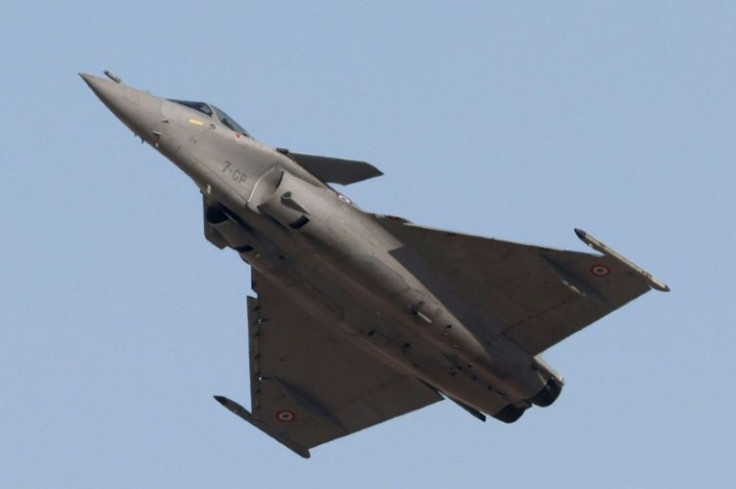Rafales On A Roll Due To Their Fighting Power To Bypass CAATSA By US

Once termed "cursed aircraft", the French Rafale is the talk of the town as the most sought-after fighter jet. Takers for Dassault Rafale are on the rise with Serbia becoming the latest entrant in the market for heavyweight fighters to achieve aerial superiority.
On Dec. 28, Serbia's defense minister Nebojsa Stefanovic said the country's air force was considering buying Rafale fighters from France, which has proved effective in bypassing the Countering America's Adversaries Through Sanctions Act (CAATSA), enacted by the Donald Trump administration in 2017.
"Modernizing the Serbian fighter jet fleet is a costly endeavor that needs to be considered strategically. The air force told the President that they are currently more inclined to buy the French-made Rafale," Stefanovic told the Radio Television of Serbia.
Away from the political environment, Rafale, churned out by Dassault Aviation, is pitted against US F-15EX and the Russian Su-35. The French twin-jet aircraft, able to operate from either land or an aircraft carrier, has proved effective for air superiority and air defense, close air support, in-depth strikes, reconnaissance, anti-ship strikes, and nuclear deterrence, among others.
Described once as a "cursed aircraft," the success story of the "omni-purpose" fighter jets, as Dassault Aviation calls them, have boosted the morale of French President Emmanuel Macron just over four months before the next presidential polls.
During its more than 25 years of existence, the jet had struggled to sell abroad and was considered the "long shadow of the American F-35." In 2011, the UAE, which placed the largest overseas order this year, had publicly rebuffed France's offer to supply 60 planes as "uncompetitive and unworkable".
But all that changed in 2015. Starting with the African nation of Egypt, Dassault Aviation has seen its order book swell and exports increased to a number of countries.
The deal to sell 80 Rafale F4 jets to the Gulf Co-operation Council (CGG) nation of the United Arab Emirates (UAE) was sealed Dec. 3.
The UAE pact to buy the latest variant of the 4.5-generation fighter aircraft was hailed as "historic" by French defense minister Florence Parly.
Éric Trappier, CEO of Dassault Aviation, described the deal as the "most important contract ever obtained by the French military aeronautics industry".
With the procurement from the UAE, more Rafale jets are now sold abroad than in France with 236 international sales compared with 192 domestic. It takes at least one month to produce a Rafale.
Egypt again shopped for 30 Rafales in May 2021 in a $5.9 billion deal to take the total number of Rafales with the air force to 54.
India in South Asia has already started inducting 32 Rafales, out of 36 ordered, into its air force this year.
Greece became the first EU nation in January 2021 when it went for 18 fighter planes in a $2.8 billion deal amidst the increased tension with Turkey.
In 2015, Qatar, another resourceful GCC nation in the volatile Middle East, announced the purchase of 24 Rafales for $6 billion. In 2018, the Gulf Sheikdom placed the order for 12 Rafales, bringing the total number to 36.
Croatia in Southeastern Europe is also planning to possess the combat jets. The deal covers spare parts, logistics, and training for the Croatian Air Force personnel.
Indonesia in South East Asia is eying to buy the French Rafale fighters as the largest Muslim country in the world abandoned plans to buy the Russian Su-35 warplanes.
On Dec 22, Air Chief Marshal Fadjar Prasety confessed to the media "with a heavy heart" the abandonment of a deal signed with Russia in 2018 to procure 11 aircraft.
The Indonesian military had decided to buy the Su-35 (Flanker-E) as a main multipurpose heavyweight fighter in 2015. The deal, based on the offset payment, including a share of commodities like coffee and palm oil, would have seen the first batch delivered in 2019.
But in between came the Countering America's Adversaries Through Sanctions Act (CAATSA) in 2017 which provides for sanctions against nations that have defence ties to Russia, North Korea and Iran.
The US federal law, brought as a response to Russia's annexation of Crimea in 2014 and its alleged meddling in the 2016 US presidential polls, bans nations from procuring major defense hardware from Russia.
The bumper sales of the "phoenix" of military aviation are partly attributed to its fighting power to bypass any possible American embargo.
























